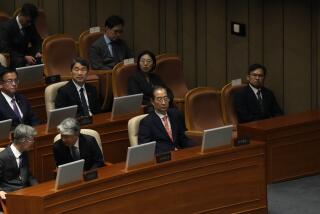S. Korea’s Kim Vows Tough Reforms in Political Scandal
- Share via
TOKYO — Sidestepping allegations of dirty money politics that have tarnished his presidency, South Korean President Kim Young Sam on Friday vowed to push through stiff campaign finance reforms before his term ends in December.
But opposition leaders said Kim is unfit to lead a political reform drive until he comes clean about the financing of his 1992 election campaign, which they allege was bankrolled by disgraced former President Roh Tae Woo and jailed tycoon Chung Tae Soo, patriarch of the bankrupt Hanbo Iron & Steel Co.
However, some analysts said if Kim is true to his word, corruption-riddled South Korea could for the first time have a serious campaign finance law in time for the December presidential election.
“If it can be done, it would be very, very meaningful,” said Moon Chung In, a professor at Yonsei University.
Kim’s 15-minute speech Friday marked the second time in four months that the president--who had promised to clean up South Korean politics--has appeared on national television to apologize to his fellow citizens for the mushrooming Hanbo corruption scandal, which has led to the arrests of several of Kim’s closest aides, a high-ranking national security official and the president’s own son.
Kim said everyone in politics, “including myself, must humbly and publicly repent for past wrongs. It would not be politically responsible, however, for us to continue to use this situation for political infighting.”
He said the Hanbo investigation has exposed “how deeply the collusion between politicians and businessmen, and corruption, have taken root in society.”
“It has plainly shown the ugly state of our politics” and “the backwardness of business management and the financial system,” Kim said, referring to the bribes Hanbo allegedly paid politicians from all three South Korean parties in exchange for pressure on bankers to make billions of dollars in loans to the dangerously overextended Hanbo Steel.
The president’s son and campaign manager, Kim Hyon Chol, has been charged with bribery and tax evasion in connection with the Hanbo affair. Prosecutors say he also controlled a $13.6-million secret political slush fund, money left over from the 1992 presidential campaign.
The president attacked the campaign system that he said has soaked up vast sums of money from the private sector, acknowledging that “enormous sums” were needed by all parties during the 1992 election.
It was a public admission of what South Koreans have long believed, namely that existing campaign financing limits have been routinely flouted.
Press reports say the 1992 Kim campaign spent $361 million--10 times more than it officially reported.
However, while indirectly acknowledging past abuses, the president drew the line when it came to opening the books on the 1992 presidential campaign.
He insisted that an accurate accounting five years after the election would be impossible--not only for his party but also for the opposition.
Yonsei professor Chaibong Hahm called this a veiled threat to Kim’s rivals to back off or brace for unpleasant disclosures about their own campaign finances.
“He’s calling their bluff, saying, ‘If you really want me to reveal all this, it will be a shambles and I won’t go down alone,’ ” Hahm said.
The tactic may give Kim’s rivals pause, but it seemed to have backfired with ordinary people, who were expecting the president to be more contrite.
“Why did he speak to the people at all?” asked Kim Sun Hee, an office worker. “We hoped to see him apologize. Instead, he lied and threatened.”
The president appealed to his fellow politicians to join him in enacting reforms to end big-money politics before the December election.
Kim proposed banning the massive election rallies that have become extremely expensive, outlawing the private political organizations that have been used to administer slush funds, introducing state-financed elections, putting limits on political fund-raising and requiring that contributions be made in the donor’s real name.
Moreover, the president promised to push these radical reforms through “at any cost,” implying that he might use a presidential decree if the legislature refuses to cooperate.
The opposition reacted with anger and disdain.
Opposition leader Kim Dae Jung said the president “should certainly remember how much money he received from former President Roh Tae Woo and Hanbo Chairman Chung Tae Soo.”
Chi Jung Nam of The Times’ Seoul Bureau contributed to this report.
More to Read
Sign up for Essential California
The most important California stories and recommendations in your inbox every morning.
You may occasionally receive promotional content from the Los Angeles Times.










